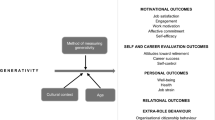Abstract
Large numbers of organisations use interviews and psychometric tests as methods of recruiting new employees. The inherent biases of these approaches are examined here for a number of common scenarios and the implications for inclusivity explored. Axiology or Value Science has been proposed as a philosophy and approach that analyses and leverages the concept of value judgement and provides practical methods by which it can be deployed to reduce organisational bias and increase inclusion via identifying, leveraging and raising the levels of cognitive diversity within organisations. In particular, the methods of Axiometrics are examined and contrasted with those of psychometrics; along with a detailed look at its validation in practice. It concludes that Axiometrics is superior to personality and behavioural based psychometrics in fostering diversity and therefore effectiveness in organisations by increasing understanding of people capability.
Access this chapter
Tax calculation will be finalised at checkout
Purchases are for personal use only
Similar content being viewed by others
References
Atiyas I, Bhorat H, Dervis K, Drysdale P, Frischtak CR et al (2013) Think tank 20: the g-20 and central banks in the new world of unconventional monetary policy. Brookings, Washington, D.C.
Austin J, Garwood B (1976) The relationship of the Hartman value profile (HVP), the Rokeach value survey (RVS), Allport-Vernon-Lindzey study of values (AVL) and Kohlberg’s theory of moral development (KMD): a series of axiometric studies, (Parts 1 and 2). Presented at the National Association of School Psychologists Convention, Cincinnati, US, March 1977
Axiometrics International Inc. (2002) Axiometrics™ validity studies of Hartman profile model. Revised 2019. www.axiometricspartners.com/images/ContentPDFs/ValidityWhitePapers/Axiometrics_Validity_Studies_prepared_by_Axiometrics_International_Inc_revised_2019.pdf. Accessed 1 Aug 2019
Blinkhorn S, Johnson C (1990) Nature 348(6303):671–672
Carpenter W (1991) Why good people do bad things. In: Edwards RB, Davis JW (eds) Forms of value and valuation: theory and applications. University Press of America, Lanham, MD, US. Republished 2014 by Wipf and Stock, Eugene, OR, US (1991, 2014)
Davis JW, Pomeroy LR (1982) Introduction to behavioural axiology, Part 1: a concurrent validity study of Hartman’s valuemetrics and value science assumptions as a revolutionary new basis for modern behavioural science application. In: Proceedings of the 2nd international conference on the Cattell 16PF test. Institute for Personality and Aptitude Testing, Inc., Champaign, IL, US
Dehaas D (2015) Unleashing valuable new perspective in the boardroom. The Financier, May 2015. www.financierworldwide.com/unleashing-valuable-new-perspectives-in-the-boardroom/#.XXZkGShKhPY. Accessed 11 Sept 2019
Deloitte (2011) Only skin deep? Re-examining the business case for diversity. www.ced.org/pdf/Deloitte_-_Only_Skin_Deep.pdf. Accessed 15 Dec 2019
Donaldson SI, Grant-Vallone EJ (2002) Understanding self-report bias in organizational behavior research. J Bus Psychol 17:245–260
Edwards RB, Davis JW (2014) Forms of value and valuation: theory and applications. Wipf and Stock, Eugene
EEOC (1978) Equal Employment Opportunities Commission. For historical purposes, the original text of the law, without any subsequent amendments. www.eeoc.gov/eeoc/history/35th/thelaw/civil_service_reform-1978.html. Accessed 20 Jan 2020
Frost S (2014) The inclusion imperative: how real inclusion creates better business and builds better societies: courage, creativity and talent. Kogan Page, London
Govindarajan V, Gupta AK (2002) Building an effective global business team. IEEE Eng Manage Rev 30(2):28
Hartman RS (1967) The structure of value: foundations of scientific axiology. Southern Illinois University Press, Carbondale
Hogan R (2014) Personality theory and assessment: predicting career success and organizational effectiveness. Presented at innovations in testing conference. Association of Test Publishers (ATP), Scottsdale, AZ, US, 2–5 March 2014
Hyland C (2017) The neuro edge: people insights for leaders and practitioners. Panoma Press, St Albans
Kline P (2000) Handbook of psychological testing, 2nd edn. Routledge, London
Liswood LA (2009) the loudest duck: moving beyond diversity while embracing differences to achieve success at work. Wiley, New Jersey
Mayo GE (1933) Human problems of an industrial civilization. Macmillan Co., New York
Michell J (1997) Quantitative science and the definition of measurement in psychology. Br J Psychol 88(3):355–383
Mischel W (1968) Personality and assessment. Wiley, New York
Peck JA, Levashina J (2017) Impression management and interview and job performance ratings: a meta-analysis of research design with tactics in mind. Front Psychol 8:201
Schmidt FL, Hunter JE (1998) The validity and utility of selection methods in personnel psychology: practical and theoretical implications of 85 years of research findings. Psychol Bull 124(2):262–274
Sears GJ, Rowe PM (2003) A personality-based similar-to-me effect in the employment interview: conscientiousness, affect-versus competence-mediated interpretations, and the role of job relevance. Can J Behav Sci 35(1):13–24
Turban DB, Moake TR, Wu SYH, Cheung YH (2017) Linking extroversion and proactive personality to career success: the role of mentoring received and knowledge. J Career Dev 44(1):20–33
Turner ME, Pratkanis AR (1998) Twenty-five years of groupthink theory and research: lessons from the evaluation of a theory. Organ Behav Hum Decis Process 73(2–3):105–115
Author information
Authors and Affiliations
Corresponding author
Editor information
Editors and Affiliations
Rights and permissions
Copyright information
© 2020 Springer Nature Switzerland AG
About this paper
Cite this paper
Burns, A., Davies, R., Langdon, P.M. (2020). Thinking Bias: The Hidden Talent Excluder. In: Langdon, P., Lazar, J., Heylighen, A., Dong, H. (eds) Designing for Inclusion. CWUAAT 2020. Springer, Cham. https://doi.org/10.1007/978-3-030-43865-4_17
Download citation
DOI: https://doi.org/10.1007/978-3-030-43865-4_17
Published:
Publisher Name: Springer, Cham
Print ISBN: 978-3-030-43864-7
Online ISBN: 978-3-030-43865-4
eBook Packages: EngineeringEngineering (R0)




